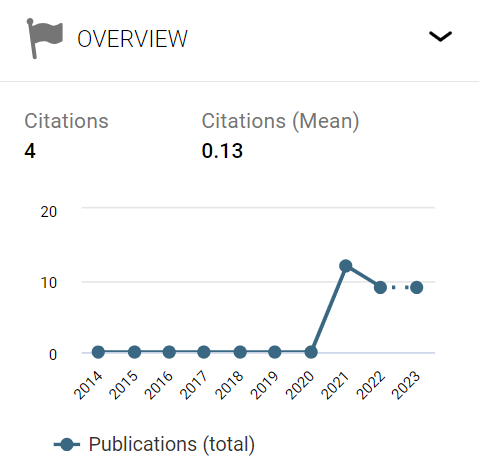Studi Cross-Textual Reading Terhadap Kisah Musa dan Panglima To Dilaling
DOI:
https://doi.org/10.52849/apokalupsis.v14i2.87Keywords:
cross-textual reading, Exodus 1-14, Moses, Panglima To DilalingAbstract
The background to this article is the leadership crisis in Indonesia. Before the 2024 general election, the author examines the characteristics of leaders who can realize people's welfare. The aim is to minimize leadership that makes people miserable. Then, the author examines the story of Panglima To Dilaling as text A and story of Musa as text B. The approach used is a cross-textual reading study. The story of Panglima To Dilaling and the story of Musa have several similar story motifs in the process of becoming a leader. A comparison of these two texts provides several characteristics of leaders who can overcome the leadership crisis and p rosper the community. Text A also provides several enriching interpretations of text B. The author finds that the story of Panglima To Dilaling enriches the story of Musa. Moses is able to free Israel because he received a call from God and because of his forgiving, sacrificial, and nurturing character. This character is the reflective material for choosing leaders.
References
Alexander, T. D. (2017). Exodus. Apollos.
Bible Works (10.0.4.114). (2015).
Cipto, H. (2017). Empat Pimpinan DPRD Sulbar Ditetapkan sebagai Tersangka Korupsi. Kompas.Com. https://regional.kompas.com/read/2017/10/04/19213811/empat-pimpinan-dprd-sulbar-ditetapkan-sebagai-tersangka-korupsi
Costa, E. Da, & Permatasari, A. D. (2022). Pentingnya Penerapan Manajemen dan Kepemimpinan Rohani Musa di Keluaran 18:1-27 dalam Kepemimpinan Gereja Masa Kini. Voice of HAMI, 4(2), 117–130. https://doi.org/10.59830/voh.v4i2.58
Davies, G. I. (2020). A Critical and Exegetical Commentary on Exodus 1–18. T & T Clark.
Ekoyanantiasih, R. (2016). Panglima To Dilaling: Cerita Rakyat dari Sulawesi Barat. Badan Pengembangan dan Pembinaan Bahasa.
Hamilton, V. P. (2011). Exodus: An Exegetical Commentary. Baker Academic.
Laia, H. Z., Prasetyo, W., & Wibowo, D. A. (2022). Dilematika Teologis Karakter Allah Dan Kehendak Bebas Firaun Dalam Keluaran 9:12. Jurnal Teologi Dan Pelayanan Kerusso, 7(1), 1–26. https://doi.org/10.33856/kerusso.v7i1.226
Listijabudi, D. K. (2019a). Bergulat di Tepian. BPK Gunung Mulia.
Listijabudi, D. K. (2019b). Pembacaan Lintas Teks: Tantangan Berhermeneutik Alkitab Asia (2). Gema Teologi, 4(1), 73–100. https://doi.org/10.21460/gema.2019.41.412
Meyers, C. (2005). Exodus. Cambridge University Press.
Ngesthi, Y. S. E., Dwikoryanto, M. I. T., & Zega, F. (2021). Kontroversi Bohong dalam Keluaran 1:8-22. Jurnal Teologi Berita Hidup, 4(1), 221–234. https://doi.org/10.38189/jtbh.v4i1.146
Panjaitan, F. (2019). Memaknai Penyelamatan Zipora terhadap Rencana Pembunuhan Musa oleh Tuhan. BIA’, 2(2), 264–277. https://doi.org/10.34307/b.v2i2.71
Parsons, M. C., & Talbert, C. H. (2008). Acts. Baker Academic.
Purba, J. L. P., Prastowo, H. F., & Rimun, R. (2022). Kajian Hermeneutis Ungkapan “Sungguh Amat Baik” dalam Kejadian 1:31 Ditinjau dari Perspektif Redemptive-Historical Approach. Charisteo, 1(2), 122–133. http://e-journal.anugrah.ac.id/index.php/JCH/article/view/14
Ronaldo, P., & Wardoyo, G. T. (2022). Teladan Kepemimpinan Musa. FORUM Filsafat Dan Teologi, 51(1), 1–12. http://ejournal.stftws.ac.id/index.php/forum/article/download/416/233
Salabai, B. (2017). Pola Kaderisasi dalam Kepemimpinan Musa terhadap Kepemimpinan Kristen Masa Kini. Logon Zoes, 1(1), 32–46. https://doi.org/10.53827/lz.v1i1.3
Saputro, A. D., & Baskoro, P. K. (2023). Allah Berperan di Belakang Layar dalam Penderitaan Orang Percaya: Teodisi dalam Narasi Keluaran 1-2. Sanctum Domine, 12(2), 133–152. https://doi.org/10.46495/sdjt.v12i2.158
Shafarina, P. I., & Nurhadi. (2023). Termasuk Lukas Enembe, Inilah 7 Gubernur yang Terjerat Kasus Korupsi. Tempo.Co. https://nasional.tempo.co/read/1678325/termasuk-lukas-enembe-inilah-7-gubernur-yang-terjerat-kasus-korupsi
Sin, S. K. (2013a). Kekerasan Hati Firaun dalam Kitab Keluaran : Tindakan Pribadi atau Tindakan Allah. Sola Gratia, 1(1), 17–27. https://doi.org/10.47596/solagratia.v1i1.3
Sin, S. K. (2013b). Musa dan Kepemimpinannya dalam Kitab Keluaran. Jurnal Theologia Aletheia, 1(2), 86–96. https://doi.org/10.47596/solagratia.v1i2.15
Sinaga, J., Sinambela, J., Pinatuli, R., & Hutagalung, S. (2021). Karakter Kepemimpinan Musa Inspirasi Setiap Pemimpin. Scripta, 12(2), 123–141. https://doi.org/10.47154/scripta.v12iNo. 2.137
Wiryono, S. (2023). Data KPK: DPR dan DPRD Peringkat Ketiga Terbanyak Sumbang Tersangka Kasus Korupsi. Kompas.Com. https://nasional.kompas.com/read/2023/07/18/16115261/data-kpk-dpr-dan-dprd-peringkat-ketiga-terbanyak-sumbang-tersangka-kasus
Zalukhu, N., Angelina, C., & Santosa, M. (2022). Konsep Kepemimpinan Musa Terhadap Pola Kepemimpinan Kristen Di Era Digital. Harvester, 7(2), 90–104. https://doi.org/10.52104/harvester.v7i2.107
Downloads
Published
How to Cite
Issue
Section
License

This work is licensed under a Creative Commons Attribution-ShareAlike 4.0 International License.









